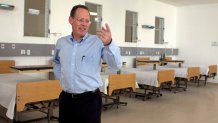Dr. Paul Farmer, a U.S. physician, humanitarian and author renowned for providing health care to millions of impoverished people worldwide and who co-founded the global nonprofit Partners in Health, has died. He was 62.
The Boston-based organization confirmed Farmer's death on Monday, calling it "devastating" and noting he unexpectedly passed away in his sleep from an acute cardiac event while in Rwanda, where he had been teaching.
"His vision for the world will live on through Partners in Health," Partners in Health CEO Dr. Sheila Davis wrote in a statement. "Paul taught all those around him the power of accompaniment, love for one another, and solidarity. Our deepest sympathies are with his family."
Farmer was a professor of medicine at Harvard Medical School and chief of the division of global health equity at Brigham and Women's Hospital. He wrote extensively on health, human rights and social inequality, according to Partners in Health.
Get top local stories in DFW delivered to you every morning. >Sign up for NBC DFW's News Headlines newsletter.
The Brigham said on Twitter that the hospital community is heartbroken by the death of their colleague, remembering Farmer as a compassionate leader and humanitarian who improved the lives of so many, near and far.
"Our thoughts are with his family and all those fortunate enough to have known this remarkable person," Brigham and Women's wrote.
Harvard Medical School wrote on Twitter there was a sense of profound sadness upon learning of Farmer's death, noting he was a physician, medical anthropologist and humanitarian who dedicated his life to improving human health on a global scale.
"A compassionate physician and infectious disease specialist, a brilliant and influential medical anthropologist, and among the greatest humanitarians of our time, perhaps all time. Paul dedicated his life to improving human health and advocating for health equity and social justice on a global scale," wrote George Q. Daley, dean of Harvard University's Faculty of Medicine, in a statement.
Partners in Health, founded in 1987, said its mission is "to provide a preferential option for the poor in health care."
The organization began its work in Cange, a rural village in Haiti's central plateau, and later expanded its operations to regions including Africa, Eastern Europe and Latin America.
Pulitzer Prize-winning author Tracy Kidder, who wrote the nonfiction book, "Mountains Beyond Mountains: The Quest of Dr. Paul Farmer, A Man Who Would Cure the World," told The Associated Press the two traveled together for a month as Farmer treated prisoners and impoverished people in Haiti, Moscow and Paris.
"He was an important figure in the world," Kidder said. "He had a way of looking around corners and of connecting things. He couldn't obviously go and cure the whole world all by himself, but he could, with help of his friends, give proof of possibility."
One of Kidder's strongest memories of Farmer occurred in Peru, where the doctor was treating patients with multidrug-resistant tuberculosis. Kidder recalled a woman wearing a Mickey Mouse shirt who followed them to their car, looking very shy. With her head down, she said, "Thank you," to Farmer in Spanish. Kidder recalled: "Paul turned, took each of her hands in his and said, 'For me, it is a privilege,' in Spanish."
He added that Farmer was instrumental in getting AIDS treatments, and created various health systems around the world.
U.S. & World
"It really humiliates the nay-sayers, who think it's somehow OK for some people to get health care and others not," Kidder said.
"It just drove him nuts." Michelle Karshan, vice president of a nonprofit prison health care system in Haiti who worked closely with Farmer, said he was determined, innovative and always knew how to get around obstacles and bureaucracy.
"He didn't take no for an answer," she said. "He didn't think anybody was too poor or too illiterate to be entitled to receive health care."
She noted that when the World Health Organization resisted giving HIV medication to people who were illiterate in Haiti for fear they would not know when or how to take it, Farmer set up his own program and created a chart that relied on the sun's position.
He also hired people known as "accompaniers," who would hike through Haiti's rough mountainous terrain to make sure patients had water, food and were taking their medications.
"I'm so sad for all the people who are not going to have him in their lives. He was there for everybody," Karshan said.

Haiti's Prime Minister Ariel Henry praised Farmer's work, as did former U.S. President Bill Clinton.
"Paul Farmer changed the way health care is delivered in the most impoverished places on Earth. He saw every day as a new opportunity to teach, learn, give, and serve, and it was impossible to spend any time with him and not feel the same," Clinton said in a statement.
At the beginning of the COVID-19 pandemic, with thousands of cases reported daily in Massachusetts, local health departments were overwhelmed by the task of contact tracing to help slow the spread of the disease. The state launched a contact tracing collaborative in April 2020, and asked Partners in Health to lead the initiative, which made more than 2.7 million calls to residents at a total cost of about $158 million, according to the state.
Massachusetts Gov. Charlie Baker reacted to the news of Farmer's death on Twitter Monday, calling Farmer a living legend and expressing his gratitude for his organization's work in the Bay State.
"Paul Farmer was a living legend - a man who made a life out of helping people in many countries address some of the world's most difficult and dangerous public health issues," Baker wrote. "His organization Partners in Health has made the world a better place in countless ways. And I will always be grateful for the work they did here in MA during some of the worst days of the pandemic. God Bless."
Tributes continued to pour in on social media Monday as news of Farmer's death spread, with many expressing heartbreak and shock over his unexpected passing. Above all, Farmer was remembered as an extraordinary human who inspired others with his selfless work.
Raj Panjabi, the incoming Senior Director for Global Health Security and Biodefense at the White House National Security Council, joined the Boston medical community in mourning the loss of Farmer.
Panjabi shared a story on Twitter about early career advice he received from Farmer.
"For nearly two decades, I had the privilege of teaching with, serving with and most of all learning from Paul. There are so many memories, but one that’s on my mind now was from our first meeting, when as a medical and public health student, I asked him for career advice," Panjabi wrote. "Paul said 'do what you love, but commit to it over the long-term — measured by decades, not years — and do it with many others.'"
"Even until his final moments, Paul was doing what he had done for decades — caring for the sick. Even until his final moments, he did it with many others — the generations of doctors, nurses and medical students he had helped train. Even until his final moments, Paul marched for health equity," Panjabi added. "I'm deeply grateful Paul for all you taught us. Your lessons, your values and your march will live on in generations to come."
“This is beyond devastating. Paul was a hero, a mentor and a friend,” Brown University’s Dr. Ashish K. Jha said on Twitter. “He taught us what global health should be and inspired all of us to do better. His brilliance was only outshined by his compassion and kindness. I'm at a loss. For the PIH family. For all of us.”
"Devastating news. Paul Farmer gave everything—everything—to others. He saw the worst, and yet did all he could to bring out the best in everyone he encountered," said Samantha Power, the administrator for the U.S. Agency for International Development. "Indefatigable, mischievous, generous, brilliant, soulful, skeptical, idealistic, beloved. A giant."
The American Red Cross said on Twitter it was heartbroken, calling Farmer an inspiring humanitarian and friend to the organization.
"His contributions to global health and equitable aid will live on," the Red Cross tweeted.
The AIDS Healthcare Foundation released a statement late Monday mourning Farmer's death and saluting him for his tireless work helping people living with HIV around the word access lifesaving medications.
“As a doctor, but most of all as a human being, Paul Farmer was a tireless champion of access to lifesaving antiretroviral treatments personally travelling to countries across the globe to deliver medicine and care,” said Michael Weinstein, President of AHF, a global nonprofit. “Farmer was deeply committed to universal access to treatment for HIV and AIDS. He will be sorely missed but leaves a legacy of decades-long leadership in Partners in Health.”
Farmer is survived by his Haitian wife, Didi Bertrand Farmer, and their three children.



